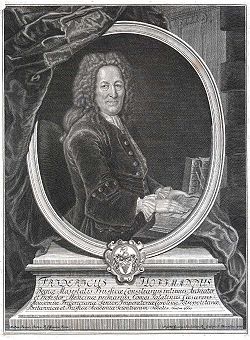
Friedrich Hoffmann
Encyclopedia

Germany
Germany , officially the Federal Republic of Germany , is a federal parliamentary republic in Europe. The country consists of 16 states while the capital and largest city is Berlin. Germany covers an area of 357,021 km2 and has a largely temperate seasonal climate...
physician
Physician
A physician is a health care provider who practices the profession of medicine, which is concerned with promoting, maintaining or restoring human health through the study, diagnosis, and treatment of disease, injury and other physical and mental impairments...
and chemist
Chemist
A chemist is a scientist trained in the study of chemistry. Chemists study the composition of matter and its properties such as density and acidity. Chemists carefully describe the properties they study in terms of quantities, with detail on the level of molecules and their component atoms...
.
Life and career
His family had been connected with medicine for 200 years before him. Born in Halle (Saale), he attended the local gymnasiumGymnasium (school)
A gymnasium is a type of school providing secondary education in some parts of Europe, comparable to English grammar schools or sixth form colleges and U.S. college preparatory high schools. The word γυμνάσιον was used in Ancient Greece, meaning a locality for both physical and intellectual...
where he acquired that taste for and skill in mathematics to which he attributed much of his after success. Beginning at age 18, he studied medicine at the University of Jena. From there, in 1680, he went to Erfurt
University of Erfurt
The University of Erfurt is a public university located in Erfurt, Germany. Originally founded in 1379, the university was closed in 1816 for the next 177 years...
, in order to attend Kasper Cramer's lectures on chemistry. Next year, returning to Jena, he received his doctor's diploma, and, after publishing a thesis, was permitted to teach. Constant study then began to tell on his health, and in 1682, leaving his already numerous pupils, he opened a practice in Minden
Minden
Minden is a town of about 83,000 inhabitants in the north-east of North Rhine-Westphalia, Germany. The town extends along both sides of the river Weser. It is the capital of the Kreis of Minden-Lübbecke, which is part of the region of Detmold. Minden is the historic political centre of the...
at the request of a relative who held a high position in that town. After practising at Minden for two years, Hoffmann made a journey to Holland and England, where he formed the acquaintance of many illustrious chemists and physicians. Towards the end of 1684, he returned to Minden, and during the next three years he received many flattering appointments. In 1688 he moved to the more promising sphere of Halberstadt
Halberstadt
Halberstadt is a town in the German state of Saxony-Anhalt and the capital of the district of Harz. It is located on the German Half-Timbered House Road and the Magdeburg–Thale railway....
, with the title of physician to the principality of Halberstadt.
In 1693, shortly after the establishment of the University of Halle, he was appointed primary professor of medicine and natural philosophy. During his career there, he held the position of rector
Rector
The word rector has a number of different meanings; it is widely used to refer to an academic, religious or political administrator...
three times. With the exception of four years (1708-1712), which he passed at Berlin
Berlin
Berlin is the capital city of Germany and is one of the 16 states of Germany. With a population of 3.45 million people, Berlin is Germany's largest city. It is the second most populous city proper and the seventh most populous urban area in the European Union...
in the capacity of royal physician, Hoffmann spent the rest of his life at Halle in instruction, practice and study, interrupted now and again by visits to different courts of Germany, where his services procured him honours and rewards. His fame became European. He was enrolled a member of many learned societies in different foreign countries, while in his own he became privy councillor.
Work
Of his numerous writings a catalogue is to be found in Haller's Bibliotheca medicinae practicae. The chief is Medicina rationalis systematica, undertaken at the age of sixty, and published in 1730. It was translated into French in 1739, under the title of Médecine raisonnée d'Hoffmann. A complete edition of Hoffmann's works, with a life of the author, was published at Geneva in 1740, to which supplements were added in 1753 and 1760. Editions appeared also at Venice in 1745 and at Naples in 1753 and 1793.He wrote a witchcraft
Witchcraft
Witchcraft, in historical, anthropological, religious, and mythological contexts, is the alleged use of supernatural or magical powers. A witch is a practitioner of witchcraft...
book, De Potentia Diaboli in Corpore, for his student Gottfried Büching.

